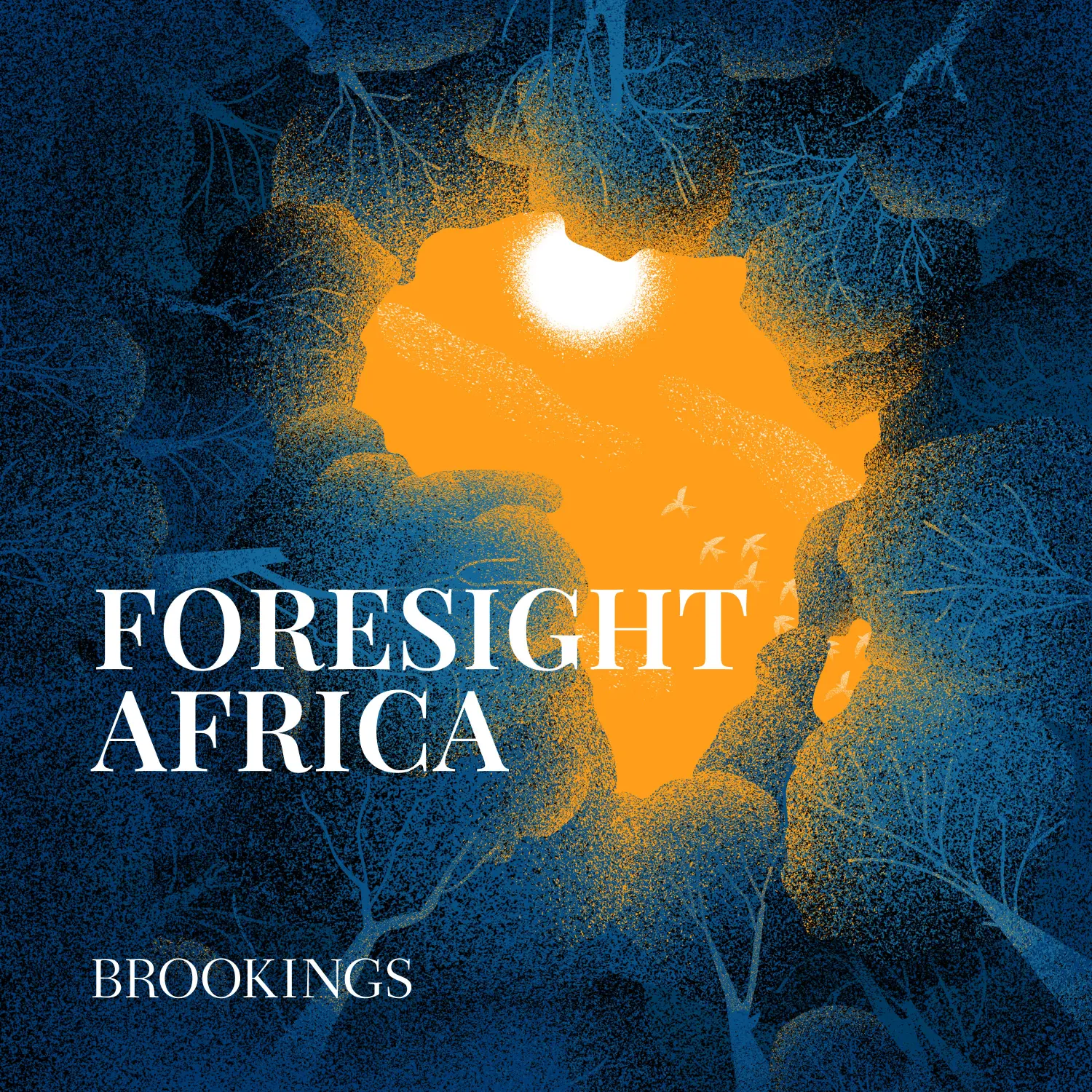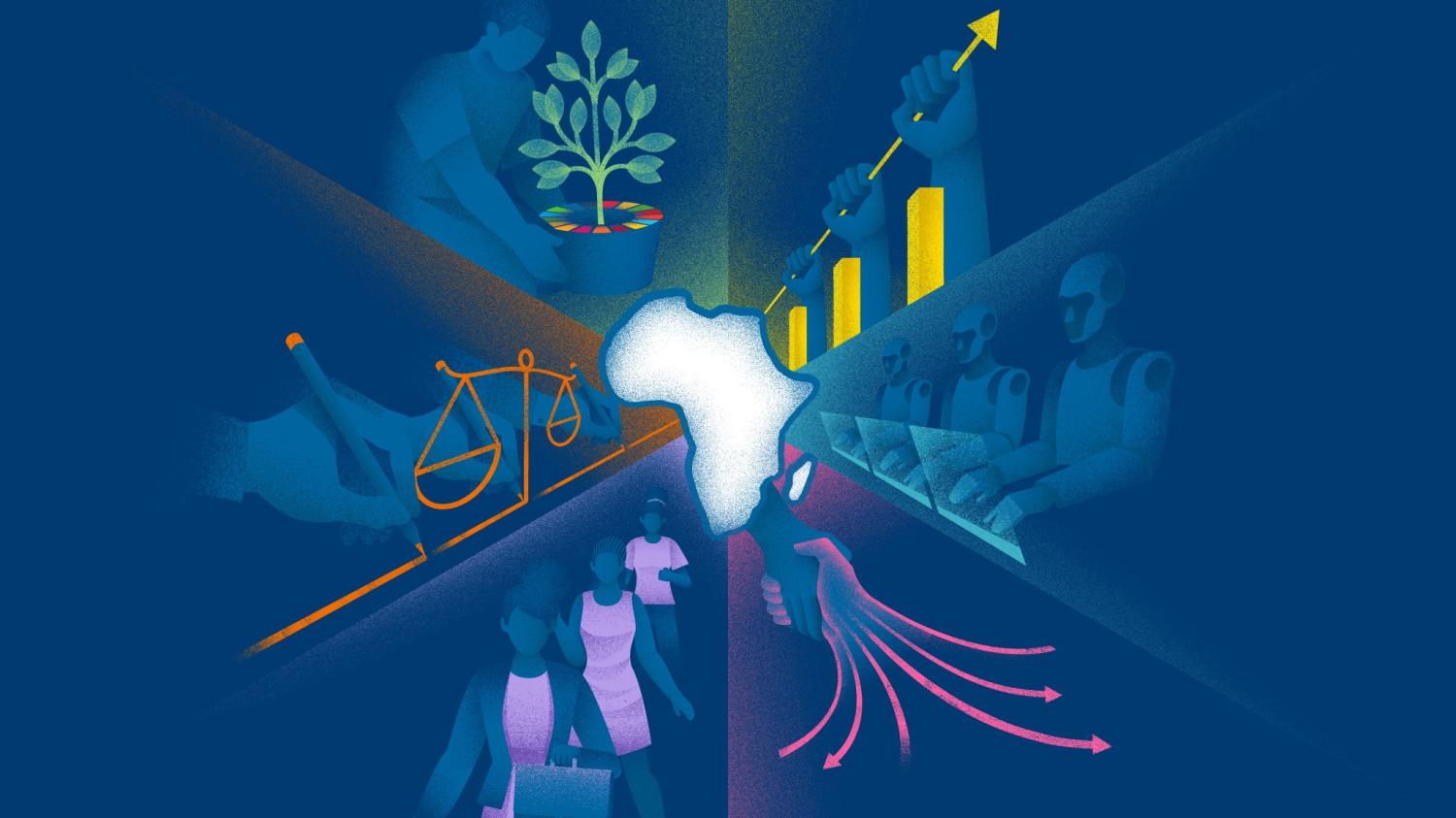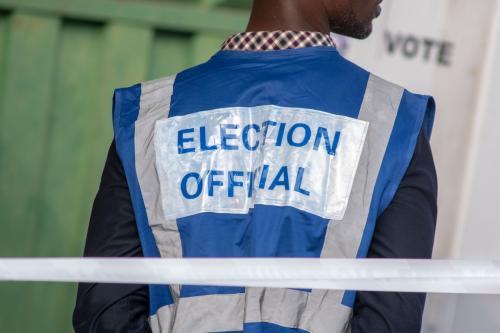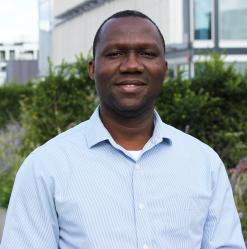Host Landry Signé and George Ofosu, assistant professor in comparative politics at the London School of Economics and Political Science, discuss Ghana’s democratic trajectory, highlighting factors that have enabled it to become a regional bastion of democracy, while also exploring what more could be done to safeguard and deepen the quality of the country’s democracy.
- Subscribe to Foresight Africa on Apple, Spotify, Afripods, or wherever you listen to podcasts.
- Listen to previous episodes.
- Watch episodes on YouTube.
- Learn about other Brookings podcasts from the Brookings Podcast Network.
- Sign up for the podcasts newsletter for occasional updates on featured episodes and new shows.
- Send feedback to [email protected].
Transcript
[music]
SIGNÉ: Hello, I am Landry Signé, senior fellow in the Global Economy and Development Program and the Africa Growth Initiative at the Brookings Institution. Welcome to the Foresight Africa podcast, where I engage with distinguished leaders in policy, business, academia, and civil society who share their unique insights and innovative solutions to Africa’s challenges while highlighting opportunities to advance engagement between Africa, the U.S., and the global community. You can learn more about this show and our work at Brookings dot edu slash Foresight Africa podcast.
My guest today is Dr. George Ofosu, assistant professor in comparative politics at the London School of Economics and a Democracy and Development Fellow at the Center for Democratic Development in Ghana. Professor Ofosu is a leading expert in African politics and democratization with publications in several leading journals. George has recently coauthored the article entitled “Ghana’s Democracy Under the Fourth Republic,” one of Brookings Africa Growth Initiative series of publications assessing the quality of democracy across Africa. The publication is part of the “Brookings AGI Strengthening Democracy in Africa: Pathways toward Inclusion, Participation, and Transformation Project” that I co-founded and I’m co-leading alongside Dr. Danielle Resnick, drawing in top democracy scholars worldwide to bridge ideas and action on building democratic resiliences.
The Strengthening Democracy in Africa Project is supported by a grant from the Open Society Foundation. The conclusions and recommendations of any Brookings publication or podcast are solely those of its authors and speakers and do not reflect the views or policies of the Institution, its management, it’s other scholar, or it’s funders. Brookings recognizes that the values it provides is in its absolute commitment to quality, Independence, and impact. Activities supported by its donors reflect this commitment.
It’s good to see you again, George. Thank you so much for joining us on the show.
OFOSU: Thank you very much, Professor Landry Signé, for having me.
SIGNÉ: Ghana is often considered an African governance success story, notably for having uninterrupted and largely peaceful elections from the return to democracy in 1992 to the most recent elections in December last year. What about Ghana’s democracy makes it so resilient?
[4:12]
OFOSU: Thank you very much, Landry, again for having me. And it has been a privilege and an opportunity for us to work with the Brookings Institution and together with the Ghana Center for Democratic Development to look into Ghana’s democratic trajectory over the past 30 years or so, and to sort of figure out what might help explain why Ghana has been resilient over the past three decades of practicing electoral democracy and on a march towards consolidation.
We, that is me as a lead author on this project, but also with Mavis Dome, Edem Selormey, and Daniel Armah-Attoh went through the books, read what people have written about Ghana’s democracy, and also looked through the data on democratic progress. And I think three things stood out to us. One is institution, the second is the political culture that is evolving in the country, both among elites and among citizens. And the third is the strength of civil society organizations that have been empowering the democratic trajectory of the country.
Let me try to break things down a little bit. So at the institutional level, we look at the constitution that ushered in the current regime, the current democratic dispensation of the country, which is the 1992 Constitution. I think it’s fundamental. It provides a legal framework that has guided political processes, institutions, civil society organization, and the general public as to what to expect and how to engage with the new regime that they have found.
Of course, Ghana has practiced democracy from 1957 since independence and had had a turbulent past. But learning from those past and writing this constitution with all its imperfection that there might be have served the country quite well. It has provisions for civil liberties, independent electoral commission, independent judiciary that has guided the way the country’s democratic processes have worked in the past. So at institutional level, with all these things that has come to define what a democracy is guaranteed within the Constitution helps in a way to guide both elites and citizens on what to expect.
[7:06]
But I think another fundamental thing has been the culture of the country, both elites and citizens. Elites have come to accept democracy as the best way that they want to govern themselves. They have rotated power amongst themselves about four times now, even when they have served in office for one year, for one term, less than the two terms that is allowed under the constitution. They have still given up power peacefully and allowed their opponent to take over, which is a credit to the political elites in the country.
Citizens widely support democracy. The Afro Barometer survey that has been conducted in the country since 1999 down to 2004, all suggest that citizens widely support democracy. So that culture, that idea of the constitution, helps to sustain the kind of democracy that we see today.
But I would be remiss if I don’t pay tribute to the work that civil society and the media have done over the years shepherding, both educating the mass public about what democracy is about and political elites about, what is allowed and not allowed under a democratic dispensation and so on. So I think civil society have done a great job from a very early start, weak start, it has grown stronger and stronger and be engaging in Ghana’s democratic processes.
So these three things, robust institutions, liberal ones, political culture, civil society, we believe have served the country quite well in its democratic building project.
SIGNÉ: Amazing, Professor George. There are those who argue that democracy should be a lesser priority for African governments, or even that it is unsuited to African societies. Especially within West Africa we have seen military governments argue for curtailing democracy to advance security and economic development. Why is democracy an important issue for Africa?
[9:40]
OFOSU: I think democracy have wide support, I would say, among African citizens. And just to say again, that survey results, evidence we have from the Afro Barometer support that there’s a huge support for democratic governance, and that people really want, yes, countries to be governed by democratic systems.
We need to distinguish in our discussion of whether citizen support or political elite support democracy by distinguishing between the intrinsic value of democracy, but also the instrumental value that people attach to democracy. I think a lot of Africans, a lot of people, citizens, value democracy for its own sake for a long time. For example, if you ask people what democracy means to them, and I’ll give an example of Ghana, people will say, democracy means “you say, and I say.” Like, say it and I will also say it. It’s about freedom of speech. It’s about liberty in articulating our concerns to political but also governing ourselves through deliberation. So people understand or people want democracy.
I think what frustrates people often is whether democracy is delivering the economic goods. And when political elite who are being elected through the democratic processes are not delivering as people expect, military regime, military government or something might take advantage of that situation to take up governance, as if people don’t want the system, not knowing it’s about the outcome of how politicians are behaving in office that people are not happy about.
But I think there is widespread support, and that means that there is an urgent need for us to focus on not only the fact that democracy cannot solve all our problems, economic problems, but to talk about how democracy help us resolve our differences, which people cherish mostly in terms of what they think democracy should be.
SIGNÉ: Amazing! When you compare countries that have successfully consolidated democracy with those that have experienced significant backsliding, what lessons should pro-democracy leaders and activists keep in mind?
[12:27]
OFOSU: I think I would re-echo what I said about educating the public about the intrinsic value of democracy that needs to be cherished beyond perhaps the instrumental outcomes. Yes, we want our leaders to deliver, but at the same time, we want to also be sure that we will be able to change government when we want to because they’re not delivering.
So for democracy promoters, I think the emphasis should be making sure that institutions that help citizens to hold our government accountable works, such that displeasure with government performance can be expressed peacefully through the ballot and through engagement– either through protest, raising petitions, or engaging in deliberative forums to help with that constant engagement, participation in the political processes, and to get citizens to understand that we are all in the governance together and that outcomes may not meet our expectations, but we were all part of the process. And that we can correct it, and that the system of governance that helps us to do that correction is democracy.
And so in my mind, democracy promoters should emphasize that value that democracy comes with.
SIGNÉ: Fantastic, George! In the report, “Ghana’s Democracy Under the Fourth Republic,” you and your co-authors identify some of these successes, but you also warn that there are some worrying signs for the country’s democratic prospects. What are some of these causes for concern?
[14:37]
OFOSU: I think one of the things that surprised me the most writing this report was about the fact that if you look at the indices of progress, the liberal scoring for Ghana is pretty high and I think in part people look at the constitution of the country, the way politicians are adhering to term limits, and scoring them high, especially on the varieties of democracy index.
But what surprised me was the fact that our scoring on what we do best and best known for, which is conducting elections, we score quite low. We score quite minimally on that dimension. And so I do study election fraud and I do study election violence. So it wasn’t something that was a surprise to me. But the fact that I would talk to people and they would say, well, you know, you Ghanaians, you complain too much, you’re doing marvelously. To see that this scoring reflects the idea that elections are not all that free and fair and that there’s a need to keep working on it I think striked a chord with me.
So what we see is, one, I mean we see two things. One is about our election processes. So even though we do very well, election periods are very heated moments. It’s characterized by vote buying, it’s characterized by violence, it’s characterized by vigilante groups. There are attacks on the media during this time. All these things still continue to undermine Ghana’s election processes.
And just the last election, 2024, we saw, you know, this paradox play just in our eyes. We saw the big political parties who are playing by the books at the top level, who even 24 hours, within a few hours when the elections have ended, they were able to tablet election results and concede defeat, congratulate their opponents. Just cementing what we have been doing.
At the same time, tabulation in election results collation centers, or tabulation centers as we call them, were not a pretty sight, an electoral commission official was so attacked by party activists in a way that they gave up their own position and said they were not doing this anymore. Before the election itself, there were about some sort of incident of violence that were reported. So these issues continue to undermine democratic process, and I think that going forward we need to keep working on that.
[17:31]
But another dimension is about our support for democracy. When you look at the bigger question about do you support democracy? Well, a huge proportion of Ghanaians says they support democracy. But then if you disaggregate this support and look at some of the dimensions of democratic outcomes, which is about freedom of association, freedom of expression, alternative sources of information, whether decision-makers needs to be elected through the ballot, support for equality before the law and so on, we still score very high. But the way that we think about democratic consolidation is that there’s not a sizable minority of citizens that could be leveraged by extremists to build up a momentum against that democratic system. The same time, you don’t want politicians to take advantage of such sentiments in society such that they can abuse their power.
So we looked at some of those dimensions and what we find is that there is a sizable proportion of Ghanaians who believe, for example, that men make better political leaders than women. That the president should be free to act without judicial constraints, which is about more than 20% of the respondents in Ghana through the Afro Barometer survey said that the president can pass law without going through parliament or the president should be free to act without legislative review. Those are things with a sizable minority of Ghanaians, about 15%, 20% that hold such views.
In that sense, I think it gives leverage for incumbents who think that they should get away with some of these infractions on democratic processes to do so.
So we think that those are some fault lines that needs to be addressed going forward.
SIGNÉ: Fabulous. Vice President Jane Naana Opoku-Agyemang is the first female vice president of Ghana. At the same time, however, less than 15% of Ghana’s current parliament are women. You have written in the past about what policies are likely to encourage more women to run and be elected to national legislatures. What do you think African countries can do to improve women’s political representation?
[20:25]
OFOSU: So thank you for that question. I think it’s an interesting question. My colleagues Michael Wahman of Michigan State University and Merete Bech Seeberg of Aarhus University, have set out to try and understand why there is lower female representation in Africa more generally. And we started with studying the demand for women candidate or politicians among citizens by trying to figure out whether citizens, want women politicians or not. Because one of the challenges is that political actors don’t want to field female candidates because they think the population do not want them.
I think survey evidence suggests that obviously there is no disadvantage to women, preference for women, among survey respondents. That does not match up to actualities on the ground. And so campaigns to promote women, especially the so-called 50-50 campaign, were launched in order to promote demand among citizens for women candidates.
What we find is that the nature of the messaging matters. So most of the time these campaigns talk about the discrimination that women face in the political arena. And we find that such messaging, rather than emphasizing, for example, the strength of women politicians, what they have achieved in office, even when it’s very small, even if it’s whatever they have achieved in office their capacity across the board, if you emphasize that without emphasizing the fact that people don’t vote for women, in actuality, that works better for electing female candidates. So the type of messaging around promoting women candidates matters.
But as I mentioned, I think entry is the key problem. When you look at the candidate list, both at the parliamentary level, local council levels, the proportion of candidates who enter these races are still really, really low. And now in Ghana, I think it’s was about 15% in the last election, which is really low. So political parties lower the fees that female candidates should pay in order to run on their tickets. And so on. I think at this national level, there needs to be something that is done about it.
But more importantly, my colleagues have now embarked on their serious research to look at the network, the political network that in a way is very male-dominant and women don’t see themselves as being able to enter this network that are gate kept by men. So we are trying to see in what ways that we can encourage admission, the ability of women to be part of this male-dominant network and see whether that encourage them to actually file for office.
SIGNÉ: Amazing, George! I always like to end each interview by asking the guest two questions. First building on your work and experience, what is one piece of advice you would give to African or global policy makers to ensure the best outcomes on the continent?
[23:59]
OFOSU: If you give me a chance for one, then I will say that I have a soft heart for credible, independent civil society organizations as the key actor or institution that needs to be strengthened needs to be helped to play an effective watchdog role in the building of democracy on the continent and for achieving outcomes that we care about.
And I’m just going to give you an example of the Ghana Center for Democratic Development, not because I’m affiliated with it, but the fact that recently Ghana held a by-election–it wasn’t actually a by-election, it was an election that was unresolved that needed to be conducted. There were a few polling stations that needed to be conducted in order to declare the results. Now, the opposition, who was an incumbent during the time of that first election, suffered a lot of political intimidation, violence during that wrap up, what I’ll call a wrap up elections that happened in a constituency in Ghana.
What was interesting, what was fascinating was that this political party went to various institutions to file a petition for the institutions to address. And part on their list was the Ghana Center for Democratic Development. This center was established in the 1990s and has been part of the Ghana political processes. They have been criticized by both sides of the political divide. But they have gained in a lot of support from both international, I think mainly from international organizations to build their capacity over the years. And, it seems, in the eyes of these political parties, they are neutral, they are strong, and therefore they thought that they could file a petition with the Center to help address the issue of political violence in the country.
And I thought that was quite fascinating development for a civil society organization, and that they were important for the peace and for arbitrating, even arbitrating conflict that might arise through the political arena.
So I think if I were to put a coin on it, I will say that it’s important to help civil society to build up their strength across the continent, not only in Ghana, but across the continent to help in the processes of democracy building.
SIGNÉ: Insightful! And second, given your successful career and impact, and please feel free to elaborate a little bit on your trajectory, what advice will you give to youth hoping to follow in your footsteps?
[27:11]
OFOSU: I find that quite complimentary and flattery and I often don’t see myself as very successful, but I would take it and thank you for that. I think I have benefited quite a lot from mentors, both in the academic world and non-academic world over the years. So I pay tribute to them that you mentioned that I’ve been successful, that they have helped me in various ways.
I started my journey way back in the University of Ghana, where I joined the so-called Ghana Liberal Students Association at the time. Was very passionate about governance, politics in my country. And then joined a civil society organization, but are also very passionate about learning and knowing what works and what doesn’t work, whether we can speak truth to power or not, and how I can best position myself to be able to do that. And I think that has motivated me quite a lot in trying to learn most of the time.
I don’t know what my magic ingredient have been, but I’ve simply followed my passion for what I love to do, which is to learn. And I give it my all. So my advice to people is that I think, and I think I hear similar stories around that people say, I followed my passion and I gave it my all day and night. I worked on it. And I kept working.
And I think, Landry, for example, I don’t know whether you remember it, someone, someone mentioned this to me that Landry works so hard. He’s like always working, always working. I think that sort of spirit of engaging most of the time with what you love and what you want to do naturally, I think that shows people that you’re someone committed and it makes them happy to help you as well. So mentorship is important.
Dedication to your own passion would open doors that you wouldn’t have imagined would happen. So I want to pay tribute to someone like Professor Gyimah-Boadi, Daniel Posner, Barbara Geddes, who saw potential and worked hard to get me where I am today.
So thank you.
SIGNÉ: Amazing, George! And it’s clear that I have known you for a while and your passion is amazing. Thank you so much for joining me today.
[music]
OFOSU: Thank you so much for having me. It’s my pleasure.
SIGNÉ: I am Landry Signé, and this has been Foresight Africa. Thank you, listeners, for joining me today.
The Foresight Africa podcast is brought to you by the Brookings Podcast Network. Send your feedback and questions to podcasts at Brookings dot edu. My special thanks to the production team including Fred Dews, producer; Nichole Grossman, Dafe Oputu, and Nicole Ntungire, associate producers; Gastón Reboredo, audio engineer; and Izzy Taylor, senior communications coordinator in Brookings Global.
The show’s art was designed by Shavanthi Mendis. Additional promotional support for this podcast comes from my colleagues in Brookings Global and the Office of Communications at Brookings.
The Brookings Institution is committed to quality, independence, and impact.
We are supported by a diverse array of funders. In line with our values and policies, each Brookings publication represents the sole views of its author(s).










Commentary
PodcastWhy is democracy succeeding in Ghana?
Listen on
Foresight Africa Podcast
September 17, 2025